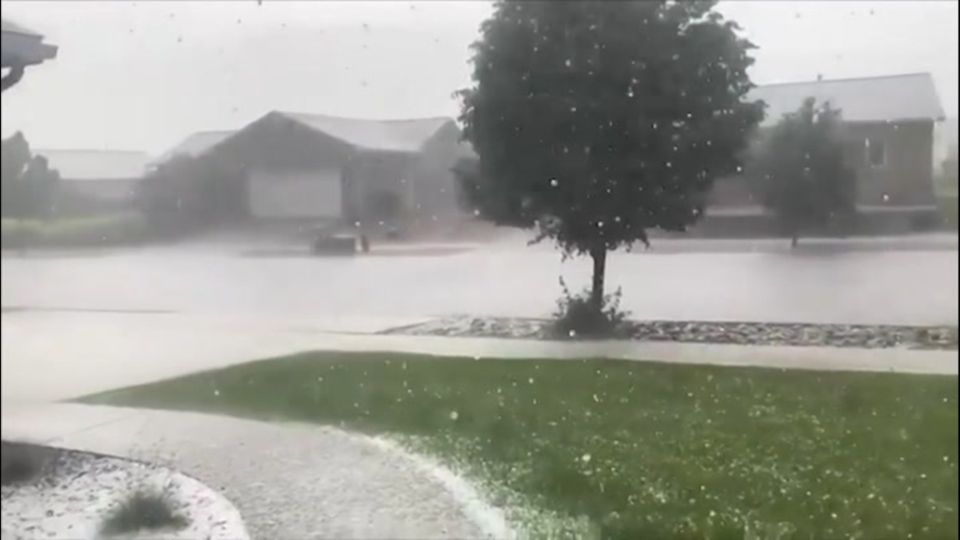A report was issued by the National Weather Service on Sunday at 7:53 p.m. It warned of strong thunderstorms in Carbon, Monroe, Berks, Lehigh, and Northampton counties until 8:15 p.m. The storms might have small hailstones the size of peas (0.25 inches) and strong gusts of wind reaching up to 40 mph.
“At 7:50 p.m., Doppler radar detected strong thunderstorms in a line from Christmans to Snyders to McKeansburg.” The weather service reported that the movement was southeast at a speed of 60 mph. “Strong winds may cause tree branches to fall and move loose items.” There is a chance that outdoor objects may experience some small damage.
The warning affects the following locations: Lehighton, Northampton, Palmerton, Bangor, Kutztown, Jim Thorpe, Hamburg, Slatington, Fleetwood, Pen Argyl, Nesquehoning, Wind Gap, Bath, Weatherly, Walnutport, Topton, Belfast, East Bangor, Lyons, and Lenhartsville. The weather service suggests, “If you are outside, it’s a good idea to find a building to take shelter in.”
Expert Safety Guidelines
Every year, lightning strikes the United States about 25 million times. Most of these electrifying events happen during the summer months. According to the weather service, lightning causes the deaths of about 20 people every year. The danger of lightning increases as thunderstorms get closer, reaching its highest point when the storm is directly above and gradually decreasing as it moves away.
If there is a thunderstorm, here are some things you can do to keep yourself safe:
1. Lightning safety plan:
- When venturing outdoors, it’s vital to establish a clear plan for seeking shelter in case of lightning.
- Monitor the sky for threatening signs and listen for the sound of thunder. If thunder is audible, it’s an indication that lightning is nearby.
- Seek a safe place to shelter, preferably indoors.
2. Indoors safety measures:
- Once you’re indoors, avoid using corded phones, electrical devices, plumbing fixtures, and stay away from windows and doors.
- These precautions help reduce the risk of electrical surges, as lightning can follow conductive pathways.
3. Wait for the all-clear:
- After the last lightning strike or thunderclap, wait at least 30 minutes before resuming outdoor activities.
- Lightning can strike even when a storm has seemingly passed, so exercise caution.
Also Read: This Colorado City Has the Highest Cancer Rates in the State
Navigating Heavy Rain
Rain can make roads dangerous. To stay safe during heavy rainfall, make sure to stay informed and follow these tips from the weather service:
Beware of swollen waterways
During heavy rain, it is important to avoid parking or walking near culverts or drainage ditches. Swift-moving water in these areas can be very dangerous.
Maintain safe driving distances
Follow the two-second rule to keep a safe distance behind the car in front of you. When it’s raining heavily, make sure to leave an extra two seconds of space between your vehicle and the one in front of you. This will help you account for the fact that the road may be more slippery and it may take longer for your brakes to work effectively.
Reduce speed and drive cautiously
It is very important to slow down when driving on wet roads. To prevent skidding, slowly release pressure on the gas pedal and avoid sudden braking.
Mind your windshield wipers
Wiper blades that are carrying too much weight can make it difficult to see clearly. If rain makes it difficult for you to see, stop your vehicle and wait until the weather gets better. Find a safe place to rest or take shelter in protected areas.
If you have no other choice but to stop on the side of the road, try to pull over as much as you can. It’s best to go past the guard rail if there is one. Stay there until the storm is over. To make sure other drivers can see you, keep your headlights on and turn on your emergency flashers.



Leave a Reply